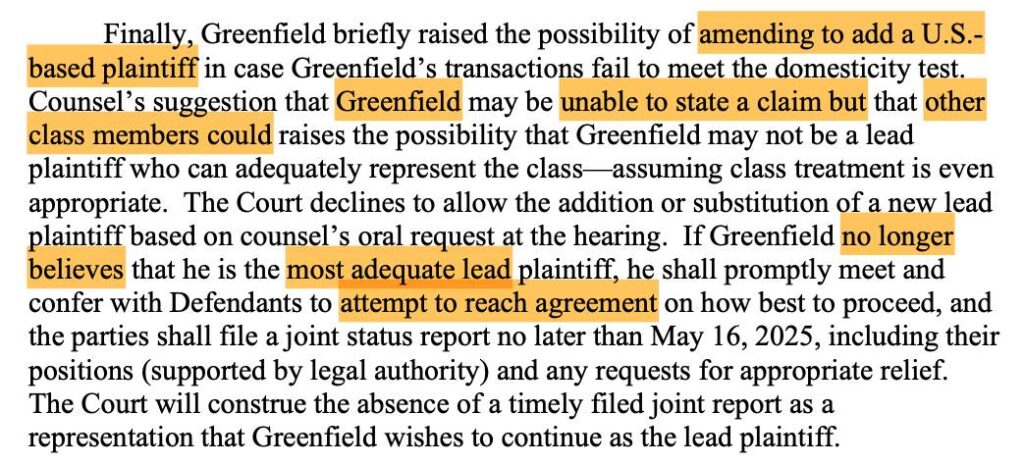The ongoing legal saga surrounding Caitlyn Jenner’s self-titled memecoin, JENNER, continues to unfold as the court has dismissed a class-action lawsuit brought against her. The suit, initially filed by a group of buyers, claimed that Jenner and her manager, Sophia Hutchins, had misled investors and sold an unregistered security. However, California District Court Judge Stanley Blumenfeld Jr. found the lawsuit lacking in sufficient detail and clarity, stating that the allegations fell short of legal standards. While the court has allowed the plaintiffs to amend their claims, they must do so with greater focus and precision by May 23.
Jack Fitzgerald, the lawyer representing the plaintiffs, expressed optimism following the ruling, noting that the court recognized the potential for valid claims. The original lawsuit accused Jenner of financially exploiting inexperienced investors, but the court determined that key claims, such as violations of securities law, could not be substantiated because the majority of transactions did not occur within the US, a critical factor in securities regulations.
“The class group intends to amend and press forward with the case,” Fitzgerald stated confidently, despite the setback.
Launched in May 2024 on the Solana blockchain, the JENNER token quickly found itself at the center of controversy after allegations of fraud against a collaborator led to its reintroduction on the Ethereum network. This transition has reportedly diminished the original token’s value, with its market cap plummeting from nearly $7.5 million to approximately $58,775, and its trading volume shrinking to just $61.10 in the last day.
The case reflects broader concerns within the cryptocurrency industry surrounding the regulation of memecoins and the potential vulnerabilities for investors, especially when celebrity endorsers are involved. As this legal battle progresses, it highlights the intricate intersection of social influence and financial responsibility in the rapidly evolving cryptocurrency landscape.
Caitlyn Jenner Memecoin Legal Case Update
This article highlights a significant legal battle surrounding Caitlyn Jenner’s memecoin, JENNER, which may have implications for both investors and the broader cryptocurrency market.
- Dismissal of Initial Lawsuit:
- The California District Court dismissed claims against Jenner for failing to support allegations of securities violations and fraud.
- Judge Stanley Blumenfeld Jr. found that the lawsuit did not adequately state a claim and required a more focused approach for any further claims.
- Legal Representation Commits to Continue:
- Jack Fitzgerald, the lawyer for the class group, expressed intent to amend the lawsuit and proceed with the legal fight.
- The class group is required to file an amended complaint by May 23, focusing on more precise claims.
- Claims of Fraud and Securities Violations:
- Investors, including lead plaintiff Lee Greenfield, accused Jenner and her manager Sophia Hutchins of fraudulently soliciting financially unsophisticated individuals to buy the JENNER token.
- Claims were dismissed due to lack of jurisdiction since purchases allegedly did not occur in the U.S.
- Impact on Investors:
- Greenfield claimed to have lost over $40,000 in this investment, raising concerns about the potential risks of investing in memecoins.
- The court’s decision may discourage future investments in unregulated cryptocurrencies that do not comply with securities law.
- Value of the JENNER Token:
- The market value of JENNER has significantly dropped from approximately $7.5 million to around $58,775, indicating a loss of investor confidence.
- The token has minimal trading volume, pointing to a lack of interest or viability in the market.
- Regulatory Implications:
- The case emphasizes the uncertain status of memecoins within U.S. securities law, which may influence future regulatory actions.
- Further clarifications on whether the tokens are classified as securities could have repercussions for other cryptocurrencies in the market.
Caitlyn Jenner Memecoin Lawsuit: A Competitive Analysis
The recent legal troubles surrounding Caitlyn Jenner’s memecoin, represented as JENNER, have sparked significant interest and debate in the cryptocurrency world. The class action lawsuit, initially thrown out by California District Court Judge Stanley Blumenfeld Jr., shines a light on the complexities of regulatory compliance and investor protection in the chaotic landscape of memecoins. This case resonates with ongoing trends in the cryptocurrency sector, particularly concerning securities law and high-profile celebrity endorsements.
Competitive Advantages: Legal actions like this serve as a litmus test for how the courts interpret emerging cryptocurrencies and blockchain technologies. The judge’s allowance for the plaintiffs to amend their claims provides a unique opportunity for those involved in the memecoin sector to refine their legal arguments and shed light on critical issues related to retail investor protections. Furthermore, this case highlights the vulnerability of celebrity-endorsed tokens, which often attract less sophisticated investors. Legal complexities may deter new entrants unsure about regulatory landscapes, possibly stabilizing the market as responsible investment practices come into greater focus.
Disadvantages: On the flip side, the legal challenges faced by JENNER underscore the risks involved for both investors and celebrities. With the court’s decision to dismiss all claims for lack of substance, the plaintiffs are left with the daunting task of crafting a more comprehensive argument. Investors, particularly those who have suffered losses, may find themselves in a prolonged legal quagmire, diverting focus from genuine market opportunities. Additionally, the market perception surrounding celebrity cryptocurrencies could suffer, making investors wary of similar investments in the future.
This struggle could potentially benefit regulatory bodies looking to establish more robust frameworks for the cryptocurrency space, as it sheds light on where existing laws are inadequate. Conversely, it creates problems for those involved in the memecoin boom, jeopardizing future investments and leading to greater apprehension in a market prone to volatility. Furthermore, this case could deter high-profile figures from stepping into similar ventures, fearing reputational harm or legal repercussions.
As this story unfolds, the dynamics of celebrity endorsements, legal accountability, and investor rights will continue to shape the landscape of memecoins and cryptocurrency at large, making it a critical point of observation for market stakeholders and potential investors alike.

















